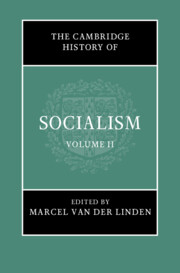Book contents
- The Cambridge History of Socialism
- The Cambridge History of Socialism
- The Cambridge History of Socialism
- Copyright page
- Contents
- Figures
- Maps
- Tables
- Contributors to Volume II
- Abbreviations
- Introduction to Volume II
- Part I Transforming State Power
- Social Democratic Routes in Europe
- 1 Social Democracy in Germany
- 2 Social Democracy in Austria
- 3 Social Democracy in Sweden
- 4 The British Labour Party
- 5 Social Democracy in Georgia
- 6 The General Jewish Workers’ Bund
- Social Democratic Routes in Australia, the Americas, and Asia
- Worldwide Connections
- Southern Trajectories
- Left Socialisms
- Part II Transversal Perspectives
- Index
- References
4 - The British Labour Party
from Social Democratic Routes in Europe
Published online by Cambridge University Press: 03 November 2022
- The Cambridge History of Socialism
- The Cambridge History of Socialism
- The Cambridge History of Socialism
- Copyright page
- Contents
- Figures
- Maps
- Tables
- Contributors to Volume II
- Abbreviations
- Introduction to Volume II
- Part I Transforming State Power
- Social Democratic Routes in Europe
- 1 Social Democracy in Germany
- 2 Social Democracy in Austria
- 3 Social Democracy in Sweden
- 4 The British Labour Party
- 5 Social Democracy in Georgia
- 6 The General Jewish Workers’ Bund
- Social Democratic Routes in Australia, the Americas, and Asia
- Worldwide Connections
- Southern Trajectories
- Left Socialisms
- Part II Transversal Perspectives
- Index
- References
Summary
The United Kingdom of Great Britain and Ireland comprised four nations and around 41.5 million people in 1900, of whom 72 per cent lived in England. In Britain, an established two-party system operated and after the extensions of the vote in 1867 and 1884 enfranchised men (about 60 per cent of men of voting age) could choose between the Liberal and Conservative parties. Most of the craft trade unions looked to the Liberal Party for social improvements and elements of liberalism had reached deep into the organized working class. But a working-class Conservative vote was also established. The parliamentary system enjoyed a wide popular legitimacy, as did the constitutional monarchy and an empire which even the left could justify (in terms of trusteeship). Prosperity was thought to depend on free trade even though Britain was the only major industrial country that took this view. At home Parliament enacted meaningful reforms often enough to give reformers belief and encouragement.
- Type
- Chapter
- Information
- The Cambridge History of Socialism , pp. 110 - 131Publisher: Cambridge University PressPrint publication year: 2022
References
Further Reading
- 1
- Cited by

